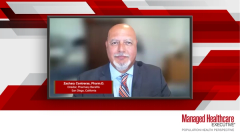
Navigating Challenges and Impact on Workflow with New NMIBC Therapies in Practice
An expert discusses how integrating newer NMIBC therapies faces operational barriers including administration logistics, staff training and formulary restrictions, while solutions require better comparative data, institutional protocols and industry partnerships to overcome unwarranted practice variation.
Episodes in this series

Video content above is prompted by the following:
Integration of newer non-muscle invasive bladder cancer (NMIBC) therapies into clinical practice faces several operational barriers that require systematic solutions. Administration logistics present the primary challenge, requiring pharmacy support for receiving, storing and handling these specialized medications. Staff training for proper storage, thawing and administration procedures is essential, along with coordination systems to ensure patients arrive at appropriate times. These logistical requirements can initially overwhelm practices unprepared for the complexity of gene therapy administration.
Provider awareness and institutional restrictions create additional barriers to implementation. Some urologists may lack familiarity with newer therapies, continuing to prescribe outdated treatments like mitomycin for BCG-unresponsive disease. Formulary restrictions, particularly in capitated healthcare settings, may limit access to these newer, more expensive therapies. These systemic barriers require targeted educational initiatives and policy changes to ensure appropriate patient access to evidence-based treatments.
Solutions center on improving data quality and standardizing treatment pathways. Comparative randomized trials are essential for establishing evidence-based treatment selection criteria and reducing unwarranted practice variation. Institutional protocols aligned with guidelines, industry partnerships for training and logistics support, and educational initiatives can help overcome implementation barriers. The development of centralized treatment pathways based on robust comparative data will ultimately reduce practice variation and improve patient outcomes across different healthcare settings.
Newsletter
Get the latest industry news, event updates, and more from Managed healthcare Executive.


























